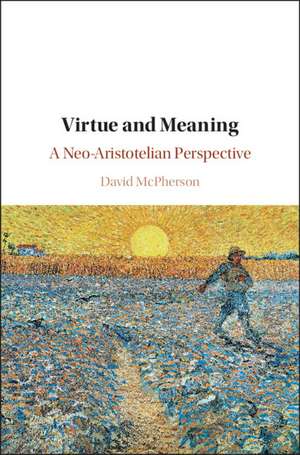Virtue and Meaning: A Neo-Aristotelian Perspective
Autor David McPhersonen Limba Engleză Paperback – 14 iul 2021
| Toate formatele și edițiile | Preț | Express |
|---|---|---|
| Paperback (1) | 282.10 lei 43-57 zile | |
| Cambridge University Press – 14 iul 2021 | 282.10 lei 43-57 zile | |
| Hardback (1) | 689.09 lei 22-36 zile | |
| Cambridge University Press – 29 ian 2020 | 689.09 lei 22-36 zile |
Preț: 282.10 lei
Nou
Puncte Express: 423
Preț estimativ în valută:
53.98€ • 56.50$ • 44.93£
53.98€ • 56.50$ • 44.93£
Carte tipărită la comandă
Livrare economică 31 martie-14 aprilie
Preluare comenzi: 021 569.72.76
Specificații
ISBN-13: 9781108745192
ISBN-10: 1108745199
Pagini: 231
Dimensiuni: 152 x 228 x 13 mm
Greutate: 0.32 kg
Editura: Cambridge University Press
Colecția Cambridge University Press
Locul publicării:Cambridge, United Kingdom
ISBN-10: 1108745199
Pagini: 231
Dimensiuni: 152 x 228 x 13 mm
Greutate: 0.32 kg
Editura: Cambridge University Press
Colecția Cambridge University Press
Locul publicării:Cambridge, United Kingdom
Cuprins
Introduction: toward re-enchantment; 1. The human form of life; 1.1 Neo-Aristotelian ethical naturalism: the disenchanted version; 1.2 The human difference: rationality; 1.3 The standpoint from within our human form of life: the space of meaning; 1.4 Strong evaluative meaning; 1.5 Going further: the way forward; 2. Virtue, happiness, and meaning; 2.1 The instrumentalist account; 2.2 The constitutive account: strong evaluative version; 2.3 The constitutive account: weak evaluative version; 2.4 Virtue apart from happiness?; 2.5 Virtue, loss, and the meaning of life; 3. Other-regarding concern; 3.1 MacIntyre on other-regarding concern; 3.2 Intrinsic worth: dignity and sanctity; 3.3 Fully amongst us: solidarity with the severely afflicted and other marginalized humans; 3.4 Moral absolutes; 3.5 Spheres of other-regarding concern: universal and particular; 4. Cosmic outlooks; 4.1 Hursthouse's three theses and Williams' challenge; 4.2 Identifying what is noblest and best; 4.3 Against quietism: the need for a moral ontology; 4.4 Rival cosmic outlooks; 4.5 A poker-faced universe?; 5. Homo Religiosus; 5.1 What is spirituality?; 5.2 What kind of naturalism?; 5.3 Human beings as Homo Religiosus; 5.4 The contemplative life; 5.5 Theistic spirituality; 5.6 Objections and replies; Conclusion.
Recenzii
'This book is strikingly excellent. It is beautifully argued, fair-minded, and a pleasure to read. It is also the most authentically neo-Aristotelian account of ethics and the moral life that I have read. In making a case for a higher, more noble, more meaningful form of life, it deserves to be widely considered, and I would not be surprised if people someday spoke of it alongside works by G.E.M. Anscombe, Alasdair MacIntyre, Charles Taylor, and a few others.' Stephen R. Grimm, Fordham University, New York
'Like other animals, human beings live lives that can be flourishing or not so flourishing. But they also quest for meaning in their lives and in their world. McPherson’s fine new book is both an exploration of the joins and the gaps between these two aspects of human nature, and also itself an example of that quest.' Sophie-Grace Chappell, The Open University
'An original and finely crafted study that takes us way beyond the standard agenda of modern virtue ethics. McPherson persuasively and illuminatingly argues that the human search for fulfilment needs to be understood within a much richer and more resonant framework of objective meaning and value than is allowed for by most contemporary moral philosophers.' John Cottingham, University of Reading, University of Roehampton, London, and Honorary Fellow of St John’s College, University of Oxford
'Like other animals, human beings live lives that can be flourishing or not so flourishing. But they also quest for meaning in their lives and in their world. McPherson’s fine new book is both an exploration of the joins and the gaps between these two aspects of human nature, and also itself an example of that quest.' Sophie-Grace Chappell, The Open University
'An original and finely crafted study that takes us way beyond the standard agenda of modern virtue ethics. McPherson persuasively and illuminatingly argues that the human search for fulfilment needs to be understood within a much richer and more resonant framework of objective meaning and value than is allowed for by most contemporary moral philosophers.' John Cottingham, University of Reading, University of Roehampton, London, and Honorary Fellow of St John’s College, University of Oxford
Notă biografică
Descriere
Argues that any adequate neo-Aristotelian virtue ethic must account for our distinctive nature as the meaning-seeking animal.
